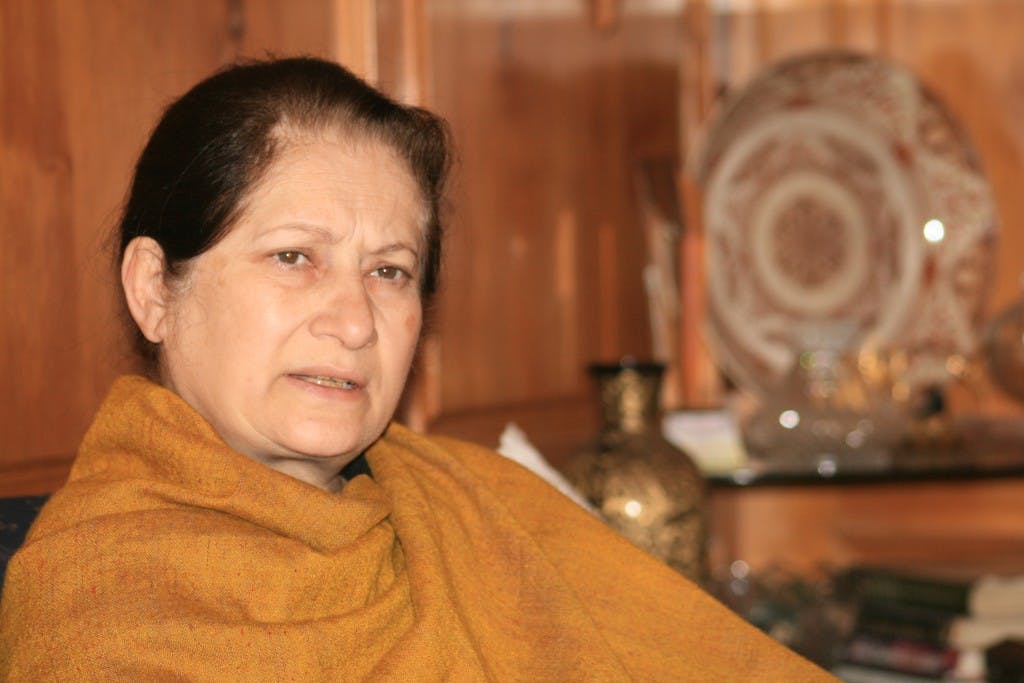A HELP-ing hand
Jan 21, 2015
Story


A smiling tall lanky boy paces across the lawn to greet the woman who has just entered the school. With motherly affection the woman inquires about the boy’s foot wrapped in crepe bandage. His countenance radiates with happiness. The boy is a student at the special school for orphans and underprivileged built by Help Foundation on the outskirts of Srinagar city. The woman is Nighat Shafi Pandit, founding member of Human Effort for Love and Peace, or the HELP Foundation, a Non Governmental Organisation dedicated to education, healthcare and rehabilitation of orphans and underprivileged women.
Most of the students at the school exhibit a rare confidence as well as happiness, thankfully devoid of any self-pity.
As she takes a customary round of the building she talks to all the staff as well as the children, inquiring individually about their work, their well-being. And the mutual admiration is more than visible.
The three storied building houses the orphanage Shehjar (meaning shade), a women empowerment centre, the school and office of the Help Foundation. Along with the boarding students the school also caters to students of the nearby areas.
This is the fruit of years of hard work by Nighat Shafi Pandit and her associates.
A bureaucrat’s wife Nighat stepped out of her cozy house in early 90’s to reach out to women and children left wanting by Kashmir’s conflict. It was a risky choice, at a time when anyone close to government was a potential target for militants. But Nighat took the risk.
Her husband had a narrow escape once when attacked by over two dozen militants. That did not deter Nighat from reaching out to the widows and orphans of militants, as well as of counter insurgents.
“Considering the situation prevailing at that time I shouldn’t have jumped into all this. My husband was in bureaucracy I was more vulnerable to certain elements. So I should have stayed out,” Nighat acknowledges.
But she has had sound lessons from her mother.
“My mother used to have a party for little kids from the locality, which was quite a poor area. She would make us, her children, sit with them and make us realize that they were never lesser than us” recalls Nighat. “Then also our religion says that if you put a hand on an orphan’s head, your sins are washed away.”
In Nighat’s childhood there was no concept of orphanages. “We wouldn’t see orphans as such, the way it has come up now. It is a mushroom growth of orphanages and at that point of time the concept was really very weird. Now you have them all around” she says.
The number of orphans in the state is believed to be between 60,000 and 100,000. (The term here refers to children who have lost their fathers and whose mothers are too poor to look after them.)
Terming the death of her mother to be a turning point in her life she says “My mother passed away in 1997, 7th of November to be precise. At that time I realised I had to do something like this for my soul”.
The same year Nighat, along with a few of her friends and colleagues of her husband, decided to do something for the people especially women and children affected by the conflict.
“Initially we went from village to village to see what the need was. I had been to areas where we were literally asked to go out because they thought we were the government agencies. I had ladies with me who were also vulnerable like me but we took our chances.”
They started a school in the backwaters of Dal Lake, which led to opening of an orphanage for children of remote areas who had nowhere to go and whose education had suffered quite a lot. “But then we stopped taking more because the concept of orphanage I felt left a mark on their psyche A child in an orphanage gets cuts off from the society, family.”
Disillusioned with the system of orphanages Nighat looked for alternatives. They started rehabilitating them in their own homes, with their mothers if they had lost their father, or in the homes of relatives willing to take them. For children with no other option, the orphanage was open.
Initially they gave sustenance allowances to women affected by the conflict. “Though the allowance was to take care of the family but it left a mark on their dignity, self respect”
This led to creation of empowerment centres where they trained women in different skills to earn their livelihood. At present there are such four centers. The centre trains the women in spice making, cutting and tailoring, embroidery. Such training institutes have also been set up in Sopore, Kulgam, Beeru, Magam, and Handwara towns.
The organisation helps these trained as well as other women in setting up small businesses. These are mostly ladies who have lost their sons, or husbands to the conflict. Also a large number of women fall into the category of Half Widows that is the women whose husbands are missing. Their case is more complicated as their tragedy is not even recognized by the government.
Rights activists say upto 10,000 men have been subjected to enforced disappearance in Kashmir. Most of them were picked up by security agencies and never traced.
Nighat says that the wives of surrendered militants were the worst lot as they had to bear brunt from both ends. They lost husbands to circumstances, and faced social sanction for being wives of renegades.
Whether a militant is killed, a counterinsurgent, or a civilian they all leave behind helpless dependants. Unlike the government which discriminates between a militant’s wife and a counter-insurgent’s, Help foundation made no such distinction.
“We are getting little girls who are school dropouts and are trying to give them some sort of livelihood. They are all conflict affected. If nothing else it at least gets them away from home for sometime. It helps them in relieving stress. These days everybody is so depressed and stressed out.”
In the empowerment centre Sameena sits quietly embroidering a bright shawl spread across her lap. Sitting close by Rihana continuously giggles as she brings to life flowers on a shawl with a needle. “I like to come here as besides earning I am able to escape from the tension at home. I love to talk to other girls here who also have problems like me. It makes me feel I am not alone,” says Rihana whose father was killed and whose mother has been finding it hard to make ends meet. Sameena on the other hand is hesitant to share her story but admits she loves to come here and is happy she is able to help her family.
“While working with women and children it was evident that most of them were in depression. They didn’t go to mental hospital because of the stigma attached. A mother would never take her depressed and traumatized daughter to the hospital, as taking her there would be like labeling her mad”.
So came up a polyclinic with psychiatrists, counselors, speech therapists, and a gynecologist.
“The clinic maintains secrecy so we have a lot of women coming to us for treatment. Another thing is that nobody realizes what depression means. So we have awareness camps in remote areas. We identify patients and then refer them to our polyclinic”.
Nighat, running a chain of schools for orphans and poor is not content with education. She wants quality education. Her schools lay stress on extra curricular activities. “I want to give these children exposure, exposure to outside world.”
IN 2006 she organized a children’s film festival in Kashmir a first of its kind. Deciding that the children should participate as well the next year a theater workshop in collaboration with Sangeet Natak Academy was organized. Children of 14 schools participated in plays on Social evils.
The organization is giving loans to students for higher studies and professional education as well. The NGO became the first to set up a library in the state, with 500 registered members.
The organization conducts residential workshops on behavioral skills, held a course on self-defence for women for which an expert trained in the self defense in conflict areas was called from outside. A special programme is run for the visually disabled and physically challenged.
Most of its funds come from Zakaat Money- a part of the assets and income a Muslim is to donate to less fortunate.
“I think it is the responsibility of everybody to do something for the people who are in need, who need help. If selfishness is there I think we have to give up on that. The word me has to go out of our vocabulary and we have to think of we.”
In 2005 Nighat was one of the 1000 women nominated jointly for the Nobel Peace Prize under the 1000 peace women project.
She was awarded Stree Shakti Award in 2006 (Women’s empowerment award) by government of India in recognition of her work.
But awards are not what Nighat works for; she works to relive the pain around her, and the work she says is unending.




